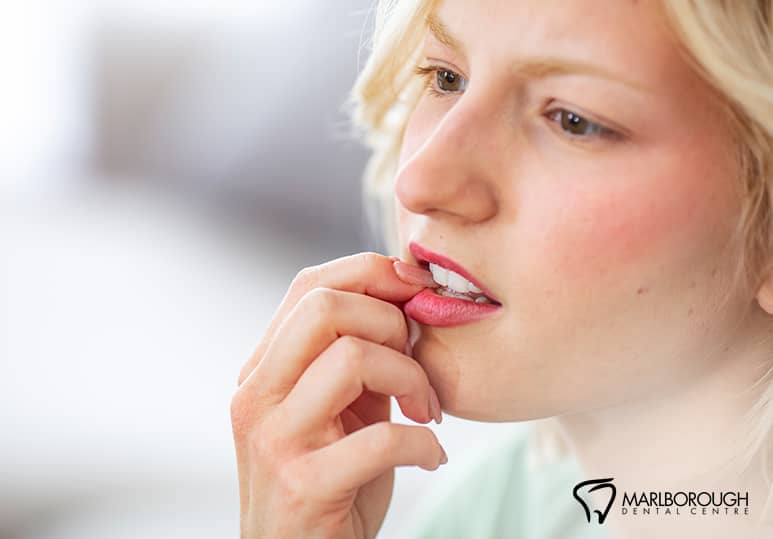Advice From a Dentist: Steer Clear of These Bad Habits
When it comes to our teeth, we only get one set in adulthood and they need to last us the long haul. Of course, having regular checkups and dental hygiene appointments will help ensure your teeth stay healthy, but it's really what happens in between those appointments that will determine the life of your smile. Here are 8 examples of what not to do:
- Not Drinking Enough Water. Yes, we hear doctors and health professionals encourage lots of water drinking, but did you know that your dentist will encourage you to get your daily limit in also? Drinking water throughout the day helps to flush away food particles, bacteria and excess acid in the mouth. Another bonus to staying hydrated is water helps to keep your teeth white when consumed after drinking a stain-causing beverage such as coffee or red wine.
- Excessive Coffee Drinking. Now just because water can help reduce stains on the teeth, that doesn’t mean that you can have free rein to drink as much coffee as you would like. Excess coffee intake will stain your teeth, can eat away at your tooth enamel, and the addition of sugar will most likely cause cavities. Enjoy your cup of joe, but keep it under control.
- Smoking and Vaping. Besides the fact that smoking stains your teeth, using tobacco, or vaping, can contribute to periodontal disease, tooth decay and loss, poor oral hygiene, and cancer. It goes without saying that any health professional will encourage you to put down any type of smoking to protect the health of your mouth.
- Teeth Grinding. If you experience headaches, tension throughout the jaw, neck and even shoulders, it might be worth checking with your dentist to see if you are grinding your teeth. This happens subconsciously for many people and can cause the tops of your teeth to wear down. Ignoring grinding can cause tooth loss, jaw misalignment, and chronic pain.
- Thumb Sucking. Yes, this one is very true! For children over the age of 5, thumb sucking can cause major issues in the development of their growing palate resulting in the need for major orthodontic work. Encourage your child to find another way to self-soothe and save their developing jaw and teeth from the trouble.
- Over Picking. Believe it, or not, but another way to damage your teeth is by using a toothpick incorrectly. A toothpick can be a handy tool to remove food stuck in your teeth, but when used incorrectly can actually cause damage to your tooth’s enamel and the tissues of your mouth. The optimal practice is to skip the pick entirely and keep some floss handy.
- Over Brushing. Since we are on the topic of overdoing things, brushing your teeth too much can have a negative effect on your smile also. Excessive brushing can cause damage to your gums and can actually remove the protective enamel on your teeth. Stick to the recommended guidelines of 2 minutes with a soft-bristled brush and daily flossing for excellent teeth.
- Misusing Your Teeth. Your teeth are not a tool! Using your teeth to open bottles, trim your nails, cut tape, open caps, and tear open packages is not at all what they were designed to do. If you play this game you are bound to eventually damage a tooth which can cause you to need a dentist for an emergency service. Protect your teeth by using them for what they were intended for: smiling, speaking, and eating.
Say Goodbye to Bad Dental Habits
Ditching the bad habits and introducing good ones will help you keep your teeth healthy and stay smiling longer. Adding more water into your routine, flossing regularly, and seeing your Calgary dentist for all dental services will ensure your smile always looks its absolute finest.
Marlborough Dental Centre in NE Calgary has been keeping patients smiling for years. With a convenient and welcoming central location, our team of dentists will be sure to protect the teeth of your entire family. Book an appointment by calling 1-403-248-2066 or by filling out the website form below.
FAQ
Q: What are considered routine dental services?
A: Depending on your coverage, in Alberta your dentist will typically recommend a complete scaling and polishing, x-rays, recall exams, and a fluoride treatment every 6 months.
Q: What's the difference between dental hygiene and dentistry?
A: Both a hygienist and dentist are trained and qualified but a hygienist’s training will be much shorter than a dentist’s. The hygienist will typically examine the mouth first, take note of any concerns, and work as part of the dentist’s team. A dentist is considered a doctor of dentistry and will go to school for a longer period of time. Dentists are capable of analyzing and recognizing issues or diseases, making referrals to other professionals if needed, and completing more complicated procedures such as fillings, crowns, root canals and tooth extractions.
Q: How are some ways to keep my teeth healthy?
A: Besides the ever-important brushing and flossing, here are some ways to extend the life of your smile:
- Eat a balanced and healthy diet
- Drink lots of water
- See your dentist regularly
- Cut out bad habits such as smoking, nail biting, and grinding




